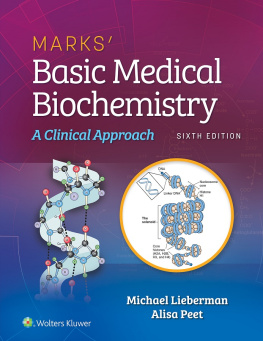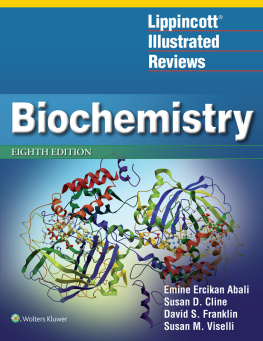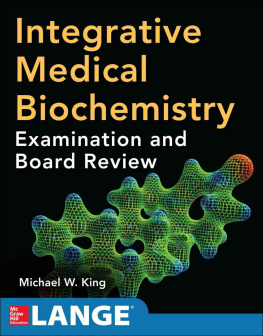John W. Baynes, PhD
Carolina Distinguished Professor Emeritus, Department of Pharmacology, Physiology and Neuroscience, University of South Carolina School of Medicine, Columbia, South Carolina, USA
Marek H. Dominiczak, MD (Dr Hab Med) FRCPath FRCP (Glas)
Professor of Clinical Biochemistry and Medical Humanities, College of Medical, Veterinary and Life Sciences, University of Glasgow, United Kingdom
Consultant Biochemist, Clinical Biochemistry Service, National Health Service (NHS) Greater Glasgow and Clyde,, Gartnavel General Hospital, Glasgow, United Kingdom
Copyright

SAUNDERS, an imprint of Elsevier Limited
2014, Elsevier Limited. All rights reserved.
First edition 1999
Second edition 2005
Third edition 2009
Fourth edition 2014
The right of John W Baynes and Marek H Dominiczak to be identified as authors of this work has been asserted by them in accordance with the Copyright, Designs and Patents Act 1988.
No part of this publication may be reproduced or transmitted in any form or by any means, electronic or mechanical, including photocopying, recording, or any information storage and retrieval system, without permission in writing from the publisher. Details on how to seek permission, further information about the Publisher's permissions policies and our arrangements with organizations such as the Copyright Clearance Center and the Copyright Licensing Agency, can be found at our website: www.elsevier.com/permissions.
This book and the individual contributions contained in it are protected under copyright by the Publisher (other than as may be noted herein).
Notices
Knowledge and best practice in this field are constantly changing. As new research and experience broaden our understanding, changes in research methods, professional practices, or medical treatment may become necessary.
Practitioners and researchers must always rely on their own experience and knowledge in evaluating and using any information, methods, compounds, or experiments described herein. In using such information or methods they should be mindful of their own safety and the safety of others, including parties for whom they have a professional responsibility.
With respect to any drug or pharmaceutical products identified, readers are advised to check the most current information provided (i) on procedures featured or (ii) by the manufacturer of each product to be administered, to verify the recommended dose or formula, the method and duration of administration, and contraindications. It is the responsibility of practitioners, relying on their own experience and knowledge of their patients, to make diagnoses, to determine dosages and the best treatment for each individual patient, and to take all appropriate safety precautions.
To the fullest extent of the law, neither the Publisher nor the authors, contributors, or editors, assume any liability for any injury and/or damage to persons or property as a matter of products liability, negligence or otherwise, or from any use or operation of any methods, products, instructions, or ideas contained in the material herein.
ISBN: 978-1-4557-4580-7
e-book ISBN: 978-1-4557-4581-4



Printed in China
Last digit is the print number: 987654321
Preface
We now present the 4th edition of Medical Biochemistry. Our aim remains, as before, to provide biochemical foundation for the study of clinical medicine with down-to-earth practical relevance.
A textbook is a snapshot of a field as it exists at the time of writing. Such photographic metaphor is appropriate here, because biochemistry undergoes constant change; in the period since the publication of the 3rd edition it has probably changed faster than ever before.
While core metabolic pathways remain largely unchanged, our understanding of underlying regulatory mechanisms is better, thanks to the progress in identifying signaling pathways. In many instances, these pathways have become targets for drugs, and underpin the impressive therapeutic progress in fields such as oncology.
Since completion of the Human Genome Project, genome-wide association studies and bioinformatic analyses have allowed us to put together a new picture of genetic regulation, the hallmarks of which are interactions between multiple, heterogeneous transcription factors and gene promoters, and the emerging field of epigenetics.
Behind this are, as had happened many times before in the history of science, major advances in methodology, including rapidly expanding genetic screening. The common denominator between methodologies now employed in genetic research laboratories and hospital clinical labs has been the advent of robotics and bioinformatics, and therefore the ability to process and interpret an ever-increasing amount of data.
This edition has again been substantially updated. We have rewritten the chapters on lipids, glucose homeostasis, nutrition and biochemical endocrinology, and added a section on the effects of exercise on muscle development and cardiovascular health. The chapter on the -omics incorporates new directions in proteomics, metabolomics and recombinant DNA technology.
This edition also benefits from the expertise of new authors who have shared their perspectives on signaling, fat and glycoconjugate metabolism, exercise biochemistry, nutrition, and blood coagulation processes.
We have expanded the chapter on the GI tract as an important interface between the organism and the environment, and now have a separate short chapter on kidney function. In both we provide more information on membrane transport systems. We remain convinced that the biochemistry of water and electrolyte balance is as important for future clinicians as the key metabolic pathways and deserve more emphasis in the biochemistry curricula.
We have updated literature and web references throughout the textbook. At the same time we were able to eliminate some web links in this edition, because search engines and websites such as Wikipedia and YouTube now provide quick access to so many rapidly evolving resources.
Throughout the text we strive to explain complex issues as simply as possible, but try hard not to become superficial. Unfortunately, new fields come with new terminologies and numerous additions to scientific slang. The discovery of new genes and new signaling pathways means new names and acronyms. We identify them here not as material to be committed to memory, but to help build a knowledge framework without oversimplification. The fact that some chapters may seem complex to the uninitiated may also reflect the true state of knowledge the complexity, or even a touch of confusion, often present before a coherent picture emerges.
The Question Bank (Self-Assessment) and many more resources are available at the Elsevier website, www.studentconsult.com, to which the reader is referred. Student Consult also provides links to other Elsevier biomedical textbooks which integrate and build on knowledge of medical biochemistry. There is also a companion publication, Medical Biochemistry Flash Cards, which provides means for quick revision.









